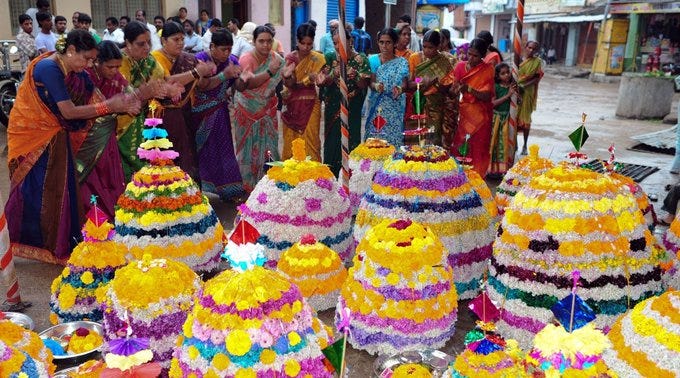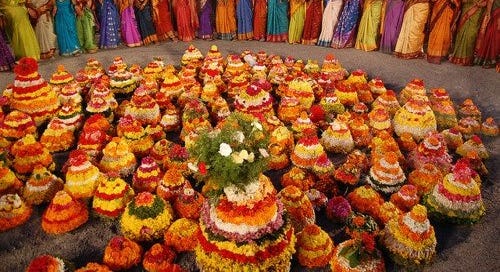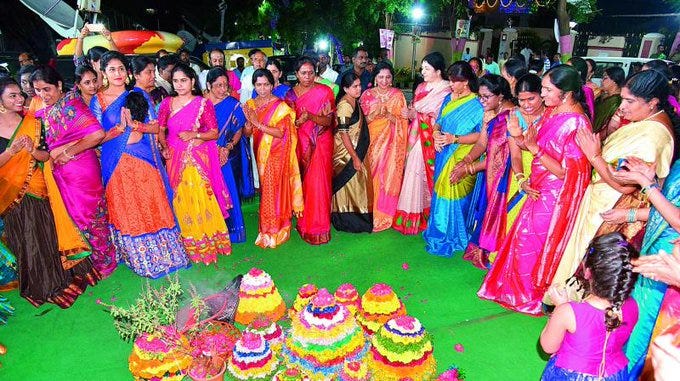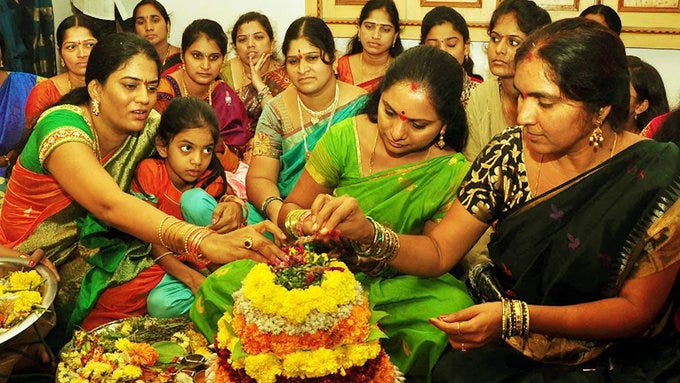While the nation celebrates the Devi Navaratri, in Telangana/ Hyderabad, along with that, Bathukamma is observed too, coinciding with the Nava Ratris. Incidentally two major festivals of Telangana- Bonalu and Bathukamma are women oriented, celebrating worship of Shakti.
It is usually celebrated during the Mahalaya Amavasya, coinciding with the Navaratri festivities. It starts on Mahalaya Amavasya, and ends with the Pedda Bathukamma on Durgashtami. The festival primarily welcomes the arrival of the Sharad season, after the rainy season, and just before the winter starts. The literal meaning of Bathukamma is "Mother come alive" as Devi is believed to represent Life itself.
It is believed that a Chola ruler, Dharmanagada after prayers for a child, was blessed with a daughter, who was the incarnation of Lakshmi herself. All the sages who visited the royal couple, blessed the little one to live forever saying Bathukamma.
Bathuku means Life, Amma is a term of endearment for women. Since then the festival is one of the main ones in Telangana, though in recent times in Hyderabad, many women from other parts of India, and even foreigners too are taking part in it.
While the young girls observe it in the belief of getting a good husband, married women do so for the prosperity and well being of their families. It mostly involves ladies dressed in saree, or langa voni( half saree) dancing around in a circle singing songs, clapping.
Also as per history, Vemulawada known for it's huge Raja Rajeswara Temple was under the Kalyani Chalukyas, who were feudatories to the Rashtrakutas. During the regular battles between Cholas and Rashtrakutas, they sided with the latter.
Parantaka Chola was a devotee of Raja Rajeswara, and his grandson Rajendra Chola, in his attack on the Chalukyas, took the massive Shiva Linga from Vemulawada as a victory gift, and this made the people there downhearted.
Apparently in order to console Parvati, on the loss of the Shiva Linga at Vemulawada, the people there made the flower stack in the form of Meru Mountain. Parvati is called as Bruhadamma in the Raja Rajeswara Temple, and it's believed Bathukamma came from this.
Another legend behind this states, that Bathukamma is meant to celebrate Sati being reborn as Parvati again. While another states, that Durga tired after slaying Mahishasura, fell asleep, her devotees prayed to her to wake up, and she did on Aswayuja Padyami.
On the first 5 days of Bathukamma, women clean their courtyard using a mix of cow dung and water( primarily in villages and small towns), and decorate it with muggulu made of rice flour( Rangoli). Different kind of flowers are gathered to make the Bathukamma.

The Bathukamma preparation is an art by itself. Women start some time in the afternoon, cutting the flowers arranging them on a wide plate. The flowers include Marigold, Crysanthemum, Lotus etc.

Bathukamma is celebrated over a period of 9 days, the main ritual involves women, moving around in a circle, of the Bathukammas, clapping, singing songs. Mostly the songs are devoted to Devi, seeking health and prosperity.
Each day of Bathukamma sees a different offering to Devi, and is named after the Naivedyam.
Day 1-Starts on Mahalaya Amavasya, called Engili Pulla Bathukamma, offering is nuvvulu(Sesame seeds) with biyyam pindi( Rice flour). Also called Pethara Amavasya in Telangana.
Day 2- Atukula Bathukamma, where the offering is Sapidi Pappu( boiled dal), bellam( jagggery) and Atukulu( Poha).
Day 3-Mudappapu Bathukkama, where the offering is of boiled dal, milk and jaggery. Mudappapu is Telugu for soft boiled dal.
Day 4-Nanabiyyam Bathukamma, offering of wet soaked rice( Nanabiyyam) and Jaggery. Actually it's Nanesina Biyyam.
Day 5- Atlu Bathukamma, basically Atlu, kind of Dosa here in Telugu state, more crisp in nature, offered to Devi.
Day 6- Aligina Bathukamma, on this day, no offering is made to Devi, as it is believed she is not in a good mood( Aligina in Telugu means sulking, Alaka is the noun form). So the Devi is left alone.
Day 7-Vepakayala Bathukamma, offering is made of Neem fruits. Again Vepa is Telugu for Neem.
Day 8-Vennamuddala Bathukamma, butter balls are offered to Devi.
Venna is Telugu for butter, Vennamudddalu is butter balls in Telugu.
Day 9- Sadulla Bathukkama also called Pedda Bathukamma, where a sumptuous feast is offered with curd rice, pulihora( tamarind rice), lemon rice, coconut rice and sesame rice. This coincides with Durga Ashtami, Saddi is a local Telugu word for cooked rice.
On the final day, the Bathukamma is immersed in water,and the symbolic turmeric idol of Gauramma is removed, the women apply the paste on their forehead. This is done amidst drum beats and lot of devotion.
Though more a Telangana specific festival, from last 4 years, Bathukamma has seen participation from many outside Telangana too. And in recent times it has been celebrated by Telugus in US, UK, Australia, Canada too.







Yes Sir, it has been celebrated in our city (Bhiwandi, Maharashtra) also by Telugus, from past 15-20 years